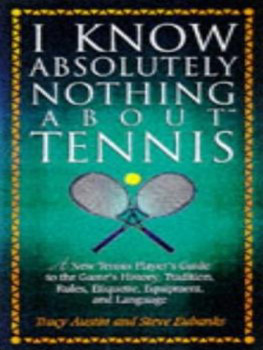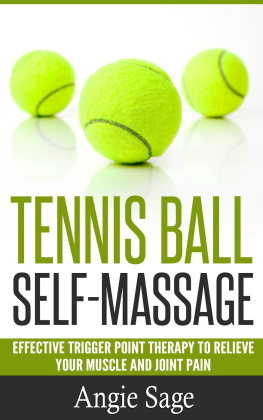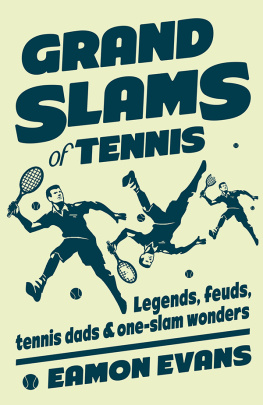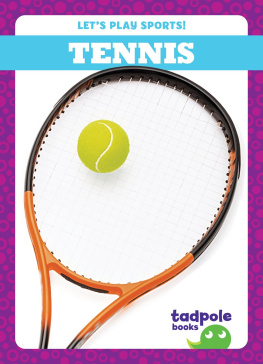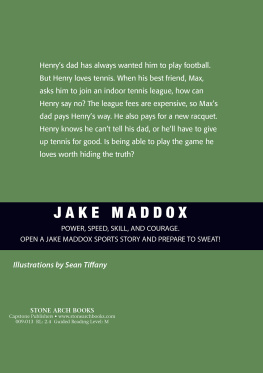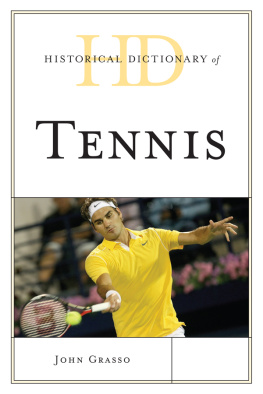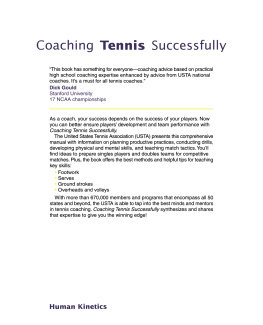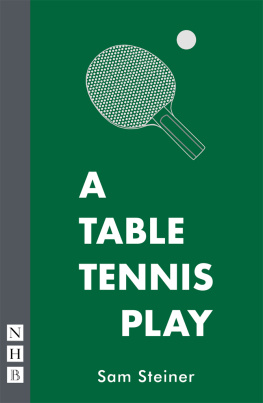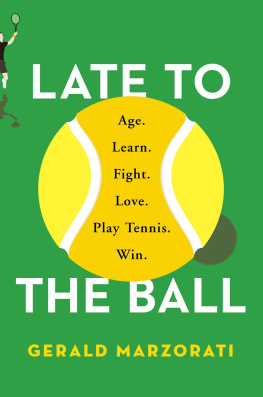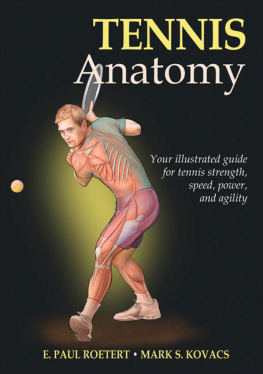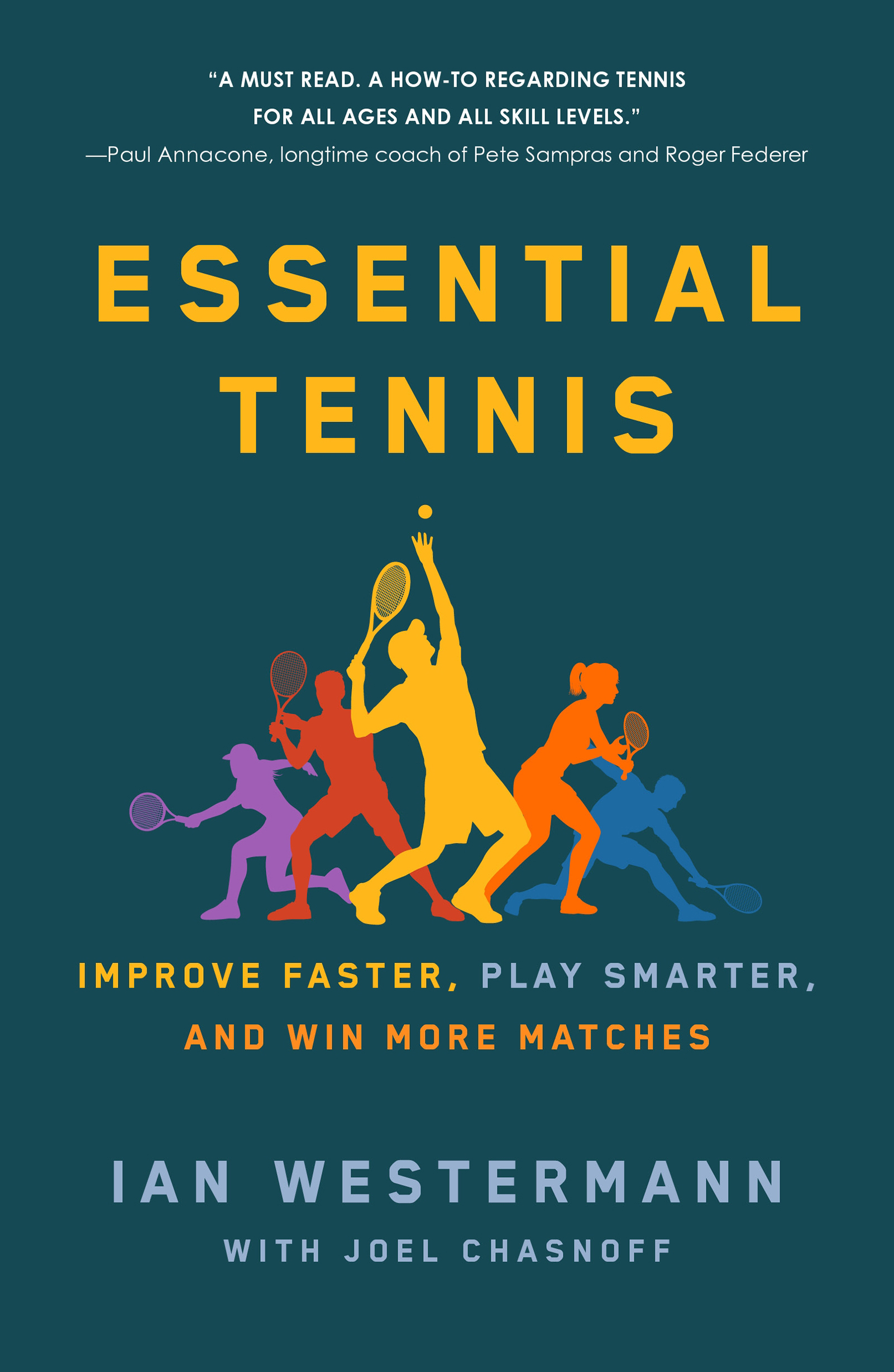Contents
Guide
Pagebreaks of the print version

The author and publisher have provided this e-book to you for your personal use only. You may not make this e-book publicly available in any way. Copyright infringement is against the law. If you believe the copy of this e-book you are reading infringes on the authors copyright, please notify the publisher at: us.macmillanusa.com/piracy.
FOR MY STUDENTS
Whats the number one thing stopping you from playing your best tennis?
For many players, the answer is probably Timethat between work, family, and other obligations, there arent enough hours to invest in training on court.
Others might say, Age. If only theyd started taking lessons years ago, when their bodies were flexible and strong, and their minds fresh, they could have been the next Agassi/Serena/Roger.
Another legitimate concern is athletic ability. Like it or not, some of us are more naturally athletic than others. Our DNA and athletic history partly determine how far we go.
And, of course, theres what may be the biggest roadblock of all: Money. Between rackets, shoes, strings, court time, and instruction, it can cost $50,000 to raise a top-level Junior player annually! If you dont have fifty grand a year to put into tennis, you need to either find yourself a benefactor (like Simona Halep, whose training was financed by a Romanian businessperson), make sacrifices (like the Djokovic family), or be lucky enough to have a parent or friend wholl coach you for free (like Richard Williams, father of Serena and Venus, or Gloria Connors, mother of Jimmy). Tennis is one of the more accessible sports, but theres no question that money can help you reach your goals.
There are other obstacles to improvement. Difficulty finding practice partners and lack of access to quality coaching and facilities come to mind.
Yet, based on my thirty years in the game and more than twenty thousand hours coaching thousands of students, I can confidently say that theres an even bigger obstacle out therean obstacle you probably never thought of, but thats holding you back from playing to your highest potential:
The ball.
You might think this sounds ridiculous. The whole point of tennis is to hit the ball over the net and inside the lines, so how can the ball be the thing thats standing in the way?
In fact, this is why the ball is such an impediment: Your desire to hit a good shot, with the right mix of power and spin and to a specific spot on the court, prevents you from striking the ball the way you should.
If only there were magical tennis balls that disappeared into thin air the instant they touched the racket strings! That way, you couldnt obsess over the flight of the ball, where it lands, or how fast it travels. Instead, youd be free to focus on how you feel as you set up and swing to contact: Am I balanced? Am I loose, or tense? Is there enough space between my body and the ball so that I can swing freely and strike the ball where I want to relative to my body, instead of the ball deciding for me?
Alas, such magical tennis balls dont exist. Instead, you need to do the next best thing: Take the ball out of the equation entirelyto say to yourself, There is no ball. This means practicing movement and swing technique without regard for what the ball does after you hit it. Because like it or not, your desire for a successful outcomein this case, to hit a good shot, with what you think is the right amount of power and spin, to a certain place on the courtwill override your ability to move and swing correctly.
To make matters worse, your urge to create a certain result causes something else: bodily tension. Muscles become tight and your heartbeat quickens as you attempt to exert control. This is subconsciousa remnant of the caveman version of you who relied on fight-or-flight reactions to cope with imminent danger. Flexed muscles and a quickened heart rate are great if youre trying to flee a tiger. Theyre less helpful, however, for hitting a backhand.
But no ball isnt just a metaphor for training. The key to hitting a tennis ball with maximum power and spin is to swing the racket as if there were no ball. Instead, the ball just happens to be in the path of your racket strings, allowing you to remain loose and relaxed.
Over the course of these thirty-eight chapters and the supporting content online, youll learn how getting better at tennis actually happens. Ill also teach you how to easily implement what you learn and integrate it into better play on court. Youll hit stronger shots, make fewer errors, and beat players who are currently beating you. The end result is that you will become a better player.
This book is every bit as much for coaches as for players. My hope is that the material in it inspires coaches to look differently at what it means to provide a student with a holistic learning experience.
Essential Tennis contains technique-based instruction on how to execute ground strokes, volleys, and servesinstruction that has proven successful over twenty years with clients of all ages and skill levels. The book is about the improvement journey itself, including the progressions, drills, and mindsets you should incorporate into your training in order to play to your highest potential.
Much of what youll learn is counterintuitive, including:
- Why often the best thing to watch is not the ball.
- How you can hit your tennis shots with dramatically increased power and spin by using less effort, not more.
- The shocking reality of how often professional players make the very same mistakes you do.
- Why correct technique often feels terribly wrong.
- A new perspective on victory, defeat, and what it means to be dominant, through the example of one of my favorite playersRafael Nadal.
And theres plenty more.
This book, like my teaching philosophy, is founded on two principles:
- For every aspect of tennis, there is one element thats more important than any other.
- If you can make even a tiny improvement in that element, you will become a better player much faster than if you focused on other things.
These two principles apply to every facet of the gamewhether its strokes, movement, strategy, or mental toughness and your attitude on court.
To be clear: There are probably a dozen things you could do right now to make, say, your forehand better. But what Im saying is that theres one element that, if you improve it, will lead to the greatest impact in the shortest amount of time. Ive dedicated the last thirty years of my life to pinpointing these essential elements so that my students can experience big improvements quickly.
A perfect example is a recent YouTube video I posted called Aim Here for Easy Winners . In the video, I explain how to win more points simply by noticing when your opponent is out of positionand then hitting into the open court.
Within days of posting the lesson, I received comments from players whod gone out and played with that one simple focus in mind and had already experienced significant results:
These basic principles have taken me from 56 games off a very strong player to winning 12 sets every time we play, and I havent changed my technique at all.
And:
I went to the court last night with this video in mind and decided to keep my strategy as simple as possible, following the principles you showed here. I usually beat my tennis mate, but this time the win came much easierI almost didnt run at all I caught myself smiling during the points noticing how many times my mate put himself in a running situation. All I had to do was punish his bad shot selection.


